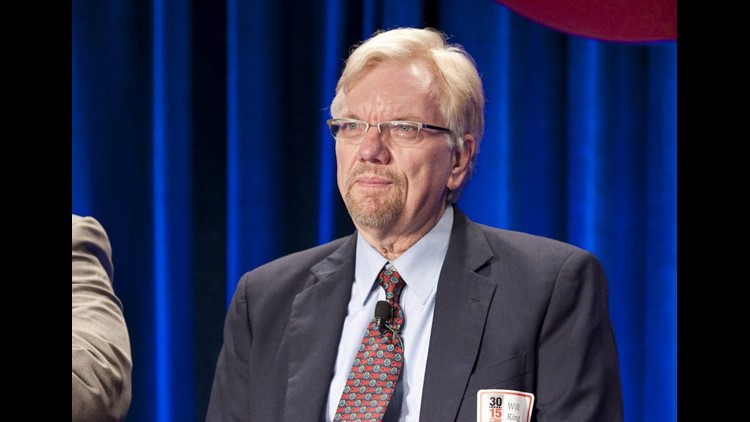Will King was a CNN original, among those who signed the network on the air in 1980, helping change the face of journalism.
King died Thursday in Atlanta after battling cancer. He was 64.
He retired from CNN in 2014. In his almost 35 years at the network, there was hardly a part of the company he had not touched.
He was part of the teams that helped launch what became HLN and CNN International networks.
He was CNN’s first Frankfurt bureau chief. While there, King worked to recruit Ken Jautz, then a young AP reporter.
“He then coached me on how to handle the interview trip to Atlanta — and told me I would have to pay for it myself!” Jautz remembered. He got the job, rising to become an executive vice president for CNN. Jautz even married a colleague hired by King.
Back in Atlanta, King became senior international editor, managing editor, then vice-president of international newsgathering, guiding news coverage of the collapse of the Soviet Union, Tiananmen Square, the wars in the Balkans and the Persian Gulf War.
In a 1994 interview with C-SPAN, King described why he was so excited about working at CNN.
“With three networks — Headline News, CNN, and CNN International — that’s 72 hours worth of programming on a daily basis. So, it’s very demanding and challenging, but if you are a journalist, this is the place to be.”
Over the decades, King earned armfuls of awards, including an Emmy, multiple Edward R. Murrow awards, Columbia du Ponts, and Peabodys.
In 2003, King was given the daunting task of overseeing CNN’s operations, including CNN’s bureaus, broadcast centers, news resources, and staff. It was an enormous job and he plunged in with gusto, but never quite took to being a suit.
He would delight in sneaking irreverent slides into his PowerPoint budget presentations, visually — and memorably — describing his roles as elephant poop cleaner or chief cat herder.
His assistant of 10 years, Jenny Day, said he barely needed her help. “He was used to doing it all in the newsroom,” Day said. “He was so self-sufficient.”
He was adored by the field teams because he stood up for them. He worked hard to keep expense reports up-to-date and keep the field crews safe.
He was principal in the creation and oversight of CNN’s Field Safety program, which required every international field employee take extensive hostile region training. It was training and support many field teams credited with saving their lives after incidents in war zones.
While an executive, he couldn’t keep himself out of the newsroom.
When big news broke, he would show up with a wry grin. “Here we go again,” was his regular newsroom greeting. His newsroom demeanor was always perfectly calm.
In October of 2000, then-Domestic Assignment Editor Colleen Wright was assigned to help out the International Desk. Her first day in her new role, she was handed oversight of Africa and part of the Middle East. Thirty minutes into her shift, the USS Cole was bombed. Within moments, then-executive Will King slipped into the seat beside her.
“I would not have gotten through that day had Will not sat down beside me,” Wright said. “He sat down to help. He was a true newsman.”
But he was also a wily negotiator, with excellent judgment on how to make things happen in difficult parts of the world. His apparently low-key style led many to underestimate him, at their peril. He always seemed to be able to make the winning deal, figure out the tough issues, whether in a budget meeting or for the team in a hellhole on the far side of the Earth.
“He was the ultimate unsung hero,” said CNN Executive Vice President Tony Maddox, who oversees CNN International. “He played the key role in getting CNN a competitive edge on so many stories.”
“And,” said Maddox, “I never knew a nicer guy.”
The CNN Alumni Facebook page was flooded with similar comments after news of King’s death broke in the newsroom.
“A kind and honorable man and human being — a big loss for the CNN family and for all who had the honor and pleasure of working with and knowing Will,” wrote former assignment manager Stefan Simons.
For many CNNers who knew and relied on King, Senior International Correspondent Ben Wedeman captured CNN’s loss in just six words: “Thanks and farewell, Will. You cared.”
In 2014, King wrote a note to some of his colleagues, describing what a joy it had been to work as a journalist behind-the-scenes.
“The truth is, few who pursue journalism as a career are seeking fame and fortune.” King wrote. “Most, like me, choose a career in news because they have a passion for capturing moments of history in words and pictures. The job can take you to places you’ve never been and put you in front of extraordinary people while making a good living.”
“So you don’t have to be recognized on the street and asked for an autograph to have a rewarding career,” he concluded.



